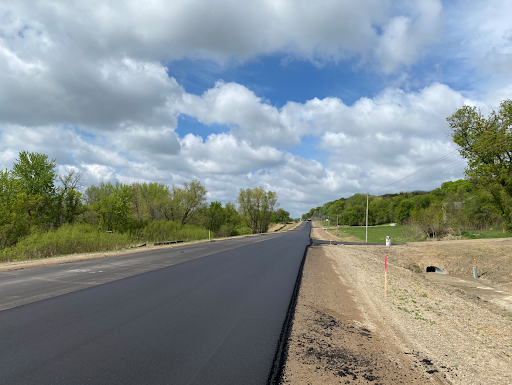Checking Out the Environmental Benefits of Warm Mix Asphalt
The application of Hot Mix Asphalt in framework tasks offers a compelling case for lasting growth and ecological stewardship. By diving into the intricate information of its manufacturing procedures and the cutting-edge usage of recycled materials, a much deeper understanding arises of how this technology goes beyond plain surface area applications. The environmental advantages of Warm Mix Asphalt extend far past first perceptions, offering a nuanced viewpoint on exactly how this product can lead the method for a greener future.

Decreased Greenhouse Gas Emissions
Warm Mix Asphalt manufacturing offers a considerable reduction in greenhouse gas discharges compared to various other sidewalk materials. The production procedure of Hot Mix Asphalt entails heating the blend of accumulation and asphalt binder to high temperature levels. This process requires less energy contrasted to the manufacturing of alternate pavement materials, resulting in lower greenhouse gas emissions. Furthermore, the use of recycled materials in Hot Mix Asphalt additionally adds to reducing its environmental impact. By incorporating reclaimed asphalt sidewalk and recycled asphalt shingles into the mix, the need for virgin products is lowered, leading to power financial savings and decreased emissions related to removal and processing.
Studies have revealed that Warm Mix Asphalt pavements have a smaller sized carbon impact over their life cycle contrasted to various other pavement alternatives. The resilience and recyclability of Warm Mix Asphalt further improve its environmental benefits by reducing the demand for frequent upkeep or replacement, therefore preserving resources and minimizing discharges related to reconstruction activities.
Energy Efficiency and Conservation
The production procedure of Warm Mix Asphalt not just minimizes greenhouse gas emissions yet likewise adds dramatically to power efficiency and conservation initiatives. Power effectiveness is a vital advantage of Warm Mix Asphalt production contrasted to other sidewalk kinds. The process includes warming the materials at high temperature levels to create the asphalt mix, which calls for less power than different methods. Furthermore, the ability to recycle and reuse asphalt pavement additionally boosts energy preservation. By including redeemed asphalt sidewalk (RAP) right into new mixes, the sector conserves energy that would have been required to generate entirely new materials. Moreover, the longevity of Warm Mix Asphalt decreases the regularity of upkeep and reconstruction, resulting in lasting power cost savings. This long life decreases the energy-intensive procedures involved in constant repair work and substitutes. On The Whole, Warm Mix Asphalt stands out as an eco-friendly alternative that focuses on energy efficiency and conservation throughout its lifecycle.
Sustainable Pavement Solutions

One key element of sustainable pavement options is making use of recycled products such as redeemed asphalt sidewalk (RAP) and recycled asphalt tiles (RAS) By incorporating these products into the asphalt mixes, the demand for virgin resources is decreased, bring about lower power intake and greenhouse gas exhausts throughout manufacturing. In addition, the reuse of these products assists draw away waste from land fills, adding to an extra sustainable and circular economic climate.
Additionally, sustainable pavement solutions focus on optimizing sidewalk layout to improve performance and longevity. Techniques such as cozy mix asphalt (WMA) and rock mastic asphalt (SMA) enhance the toughness and durability of pavements, reducing the need for constant repair services and substitutes. By executing these innovative approaches, facilities developers can create pavements that not only fulfill high-performance criteria however likewise minimize their ecological impact.
Minimized Environmental Impact
Hot mix asphalt, in certain, offers numerous benefits that add to decreasing the total environmental impact of roadway facilities. One vital aspect is the recyclability of asphalt, which can be recycled numerous times without endangering its high quality - Regrading.
Additionally, the manufacturing of hot mix asphalt you can try here sends out lower levels of greenhouse gases contrasted to various other pavement materials, making it a much more eco friendly choice. The power efficiency of asphalt plants has also enhanced for many years, leading to decreased gas usage and reduced exhausts. In addition, the smooth surface of hot mix asphalt decreases rolling resistance for cars, leading to lower fuel usage and reduced air contamination from automobile exhausts.
Contribution to Climate Modification Mitigation
Hot mix asphalt plays a critical role in mitigating climate change through its sustainable homes and minimized ecological impact. One significant payment to climate modification mitigation comes from the energy effectiveness of warm mix asphalt production. Compared to various other pavement options, the production procedure for warm mix asphalt takes in less energy and produces lower degrees of greenhouse gases, hence lowering its total carbon impact.
In addition, warm mix asphalt's capability to reflect sunlight, called albedo, aids in minimizing metropolitan heat island effects. By minimizing warmth absorption and retention, warm mix asphalt pavements can lower the need for a/c in metropolitan areas, consequently lowering greenhouse gas discharges connected with power intake for cooling purposes.
Additionally, the longevity and recyclability of warm mix asphalt even more boost its environment change reduction abilities. Regrading. The long click lifespan of asphalt sidewalks minimizes the need for constant repair work or substitutes, inevitably reducing the carbon exhausts linked to roadway maintenance tasks. The recyclability of asphalt products reduces the demand for virgin sources and reduces the environmental influence of pavement building, aligning with lasting methods for climate modification reduction.
Conclusion
Finally, the ecological benefits of Hot Mix Asphalt show its significant payment to decreasing greenhouse gas discharges, preserving energy, and reducing ecological influence. This sustainable pavement service lines up with climate adjustment mitigation initiatives, advertises resource conservation, and improves framework advancement. By using recycled products, energy-efficient manufacturing processes, and resilient style, Warm Mix Asphalt plays an important role in fostering an extra ecologically friendly technique to facilities construction.
The production process of Hot Mix Asphalt includes heating the mix of aggregate and asphalt binder to high temperatures. By integrating recovered asphalt pavement and recycled asphalt roof shingles right into the mix, the requirement for virgin products is decreased, leading to power cost savings and reduced emissions associated with removal and processing.
One key element of lasting sidewalk options is the usage of recycled materials such as reclaimed asphalt pavement (RAP) and recycled asphalt roof shingles (RAS) Methods such as that site warm mix asphalt (WMA) and stone mastic asphalt (SMA) improve the toughness and durability of pavements, decreasing the demand for constant fixings and substitutes. Compared to other sidewalk alternatives, the production process for hot mix asphalt consumes much less power and emits reduced degrees of greenhouse gases, hence reducing its total carbon impact.